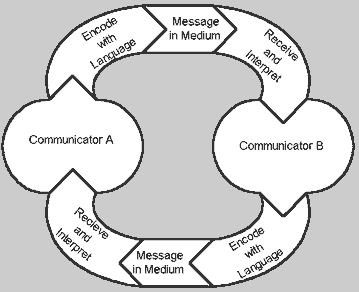This model acknowledges neither creators nor consumers of messages, preferring to label the people associated with the model as communicators who both create and consume messages. The model presumes additional symmetries as well, with each participant creating messages that are received by the other communicator. This is, in many ways, an excellent model of the face-to-face interactive process which extends readily to any interactive medium that provides users with symmetrical interfaces for creation and consumption of messages, including notes, letters, C.B. Radio, electronic mail, and the radio. It is, however, a distinctly interpersonal model that implies an equality between communicators that often doesn't exist, even in interpersonal contexts. The caller in most telephone conversations has the initial upper hand in setting the direction and tone of a a telephone callr than the receiver of the call (Hopper, 1992).In face-to-face head-complement interactions, the boss (head) has considerably more freedom (in terms of message choice, media choice, ability to frame meaning, ability to set the rules of interaction) and power to allocate message bandwidth than does the employee (complement). The model certainly does not apply in mass media contexts.
The "masspersonal" (xxxxx, 199x) media of the Internet through this implied symmetry into even greater relief. Most Internet media grant everyone symmetrical creation and consumption interfaces. Anyone with Internet access can create a web site and participate as an equal partner in e-mail, instant messaging, chat rooms, computer conferences, collaborative composition sites, blogs, interactive games, MUDs, MOOs, and other media. It remains, however, that users have very different preferences in their message consumption and creation. Some people are very comfortable creating messages for others online. Others prefer to "lurk"; to freely browse the messages of others without adding anything of their own. Adding comments to a computer conference is rarely more difficult than sending an e-mail, but most Internet discussion groups have many more lurkers (consumers of messages that never post) than they have contributors (people who both create and consume messages). Oddly, the lurkers sometimes feel more integrated with the community than the contributors do (Baym, 2000).

No comments:
Post a Comment